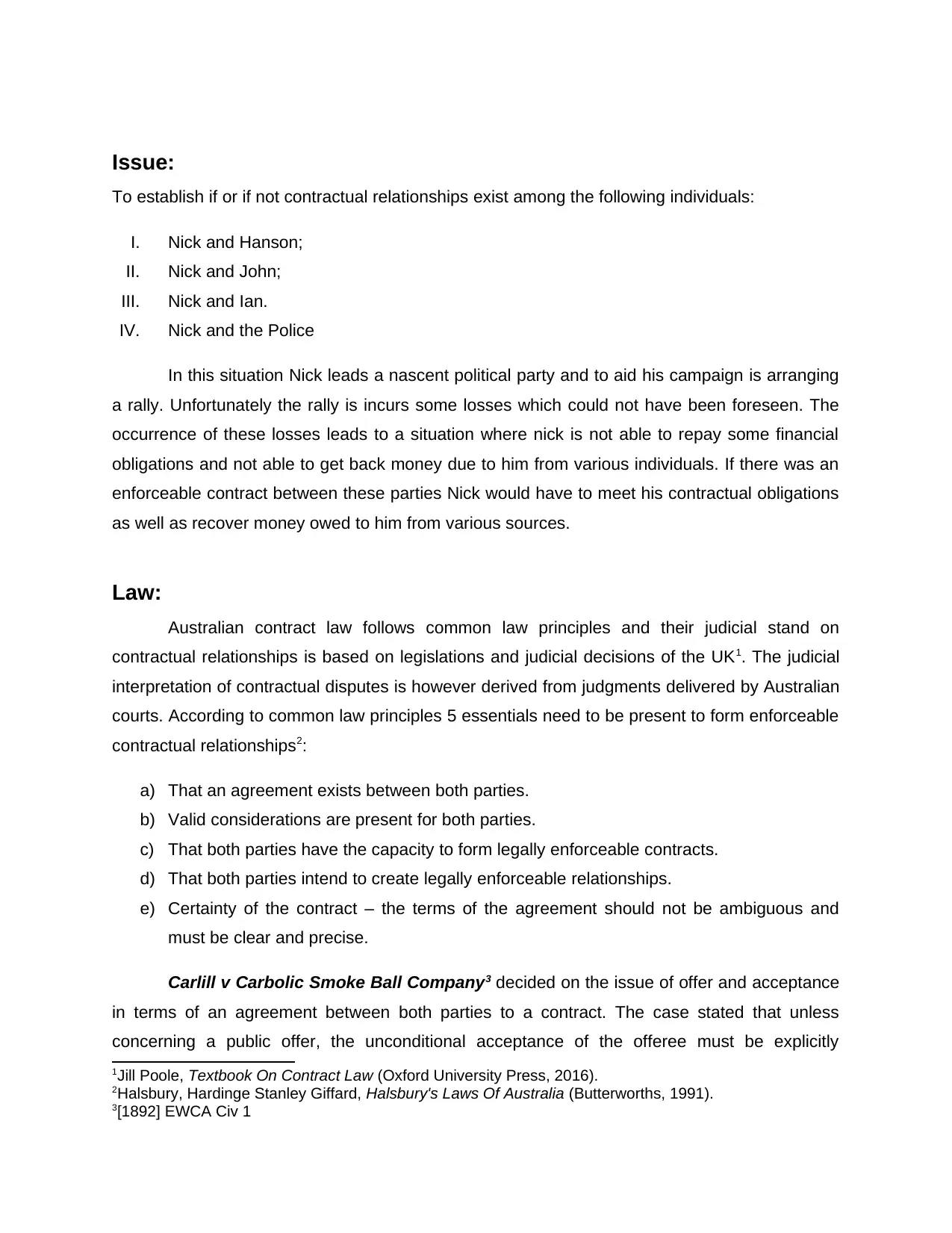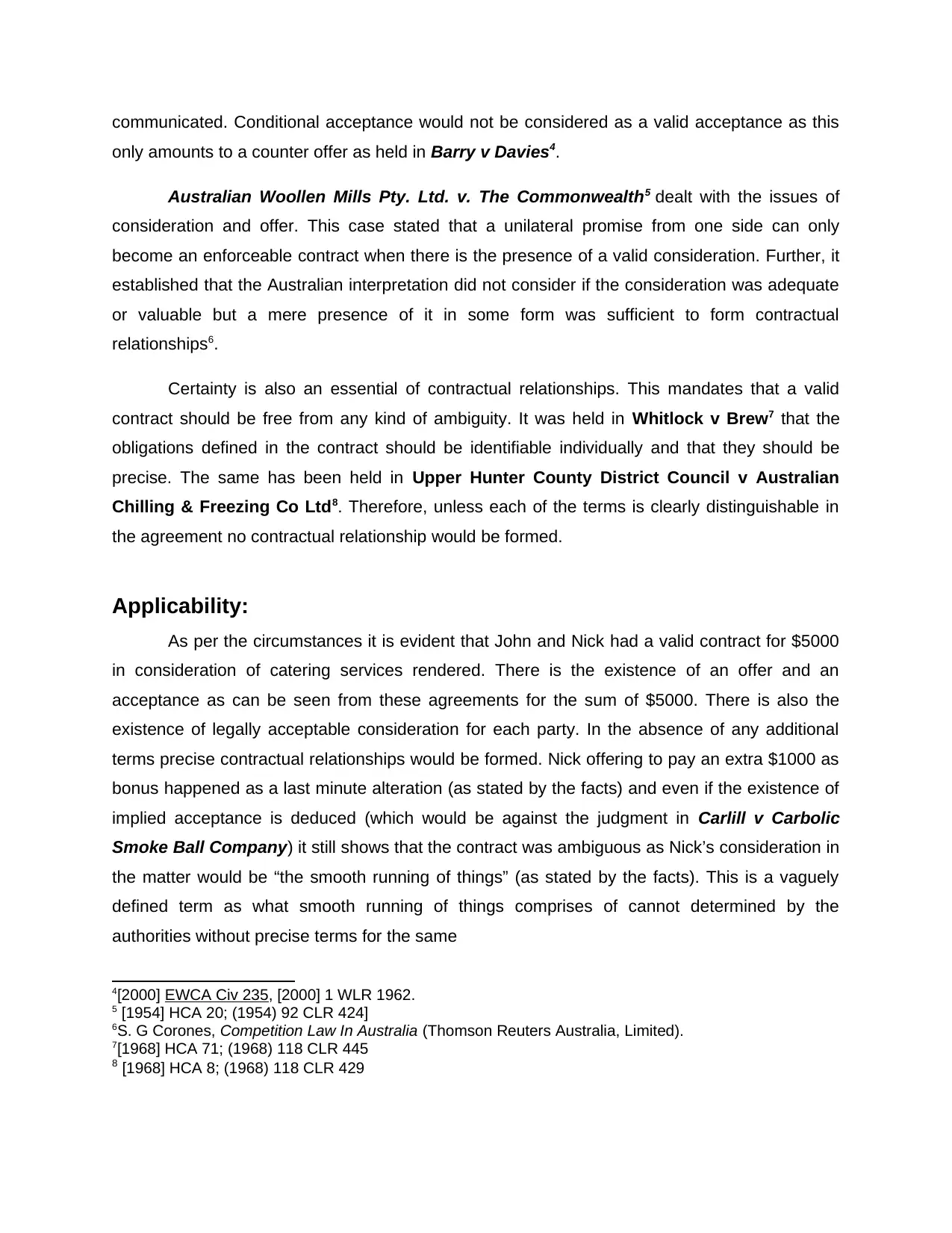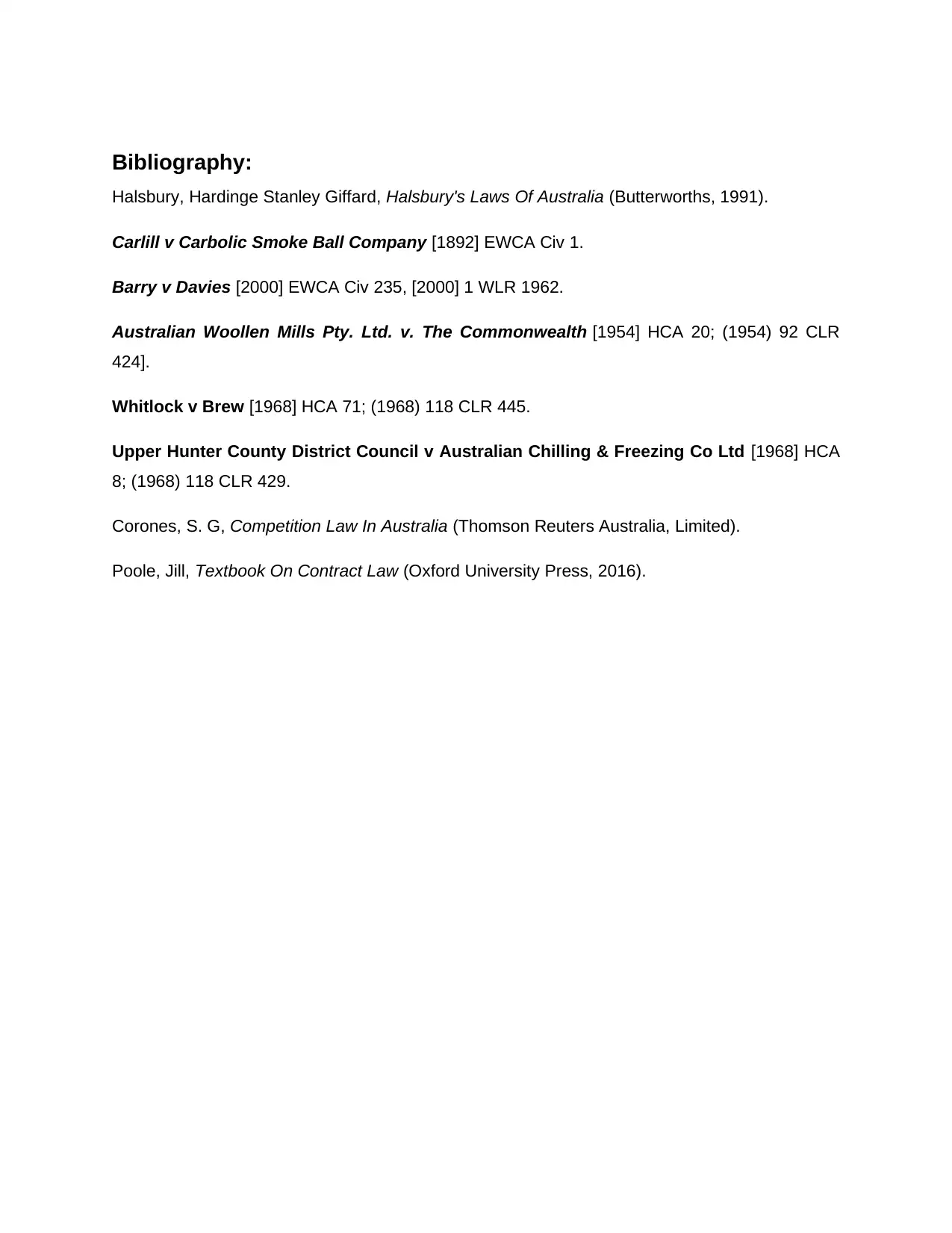Contractual Obligations in Australia: Case Analysis and Law Review
VerifiedAdded on 2021/04/17
|6
|1285
|86
Report
AI Summary
This report provides an analysis of contractual obligations under Australian law, focusing on a case study involving a political rally and the agreements made between Nick and various parties. It examines the presence or absence of enforceable contracts based on the principles of offer and acceptance...

Running head: CONTRACTUAL OBLIGATIONS IN AUSTRALIA
CONTRACTUAL OBLIGATIONS IN AUSTRALIA
Name of the Student
Name of the University
Author note
CONTRACTUAL OBLIGATIONS IN AUSTRALIA
Name of the Student
Name of the University
Author note
Paraphrase This Document
Need a fresh take? Get an instant paraphrase of this document with our AI Paraphraser

Issue:
To establish if or if not contractual relationships exist among the following individuals:
I. Nick and Hanson;
II. Nick and John;
III. Nick and Ian.
IV. Nick and the Police
In this situation Nick leads a nascent political party and to aid his campaign is arranging
a rally. Unfortunately the rally is incurs some losses which could not have been foreseen. The
occurrence of these losses leads to a situation where nick is not able to repay some financial
obligations and not able to get back money due to him from various individuals. If there was an
enforceable contract between these parties Nick would have to meet his contractual obligations
as well as recover money owed to him from various sources.
Law:
Australian contract law follows common law principles and their judicial stand on
contractual relationships is based on legislations and judicial decisions of the UK1. The judicial
interpretation of contractual disputes is however derived from judgments delivered by Australian
courts. According to common law principles 5 essentials need to be present to form enforceable
contractual relationships2:
a) That an agreement exists between both parties.
b) Valid considerations are present for both parties.
c) That both parties have the capacity to form legally enforceable contracts.
d) That both parties intend to create legally enforceable relationships.
e) Certainty of the contract – the terms of the agreement should not be ambiguous and
must be clear and precise.
Carlill v Carbolic Smoke Ball Company3 decided on the issue of offer and acceptance
in terms of an agreement between both parties to a contract. The case stated that unless
concerning a public offer, the unconditional acceptance of the offeree must be explicitly
1Jill Poole, Textbook On Contract Law (Oxford University Press, 2016).
2Halsbury, Hardinge Stanley Giffard, Halsbury's Laws Of Australia (Butterworths, 1991).
3[1892] EWCA Civ 1
To establish if or if not contractual relationships exist among the following individuals:
I. Nick and Hanson;
II. Nick and John;
III. Nick and Ian.
IV. Nick and the Police
In this situation Nick leads a nascent political party and to aid his campaign is arranging
a rally. Unfortunately the rally is incurs some losses which could not have been foreseen. The
occurrence of these losses leads to a situation where nick is not able to repay some financial
obligations and not able to get back money due to him from various individuals. If there was an
enforceable contract between these parties Nick would have to meet his contractual obligations
as well as recover money owed to him from various sources.
Law:
Australian contract law follows common law principles and their judicial stand on
contractual relationships is based on legislations and judicial decisions of the UK1. The judicial
interpretation of contractual disputes is however derived from judgments delivered by Australian
courts. According to common law principles 5 essentials need to be present to form enforceable
contractual relationships2:
a) That an agreement exists between both parties.
b) Valid considerations are present for both parties.
c) That both parties have the capacity to form legally enforceable contracts.
d) That both parties intend to create legally enforceable relationships.
e) Certainty of the contract – the terms of the agreement should not be ambiguous and
must be clear and precise.
Carlill v Carbolic Smoke Ball Company3 decided on the issue of offer and acceptance
in terms of an agreement between both parties to a contract. The case stated that unless
concerning a public offer, the unconditional acceptance of the offeree must be explicitly
1Jill Poole, Textbook On Contract Law (Oxford University Press, 2016).
2Halsbury, Hardinge Stanley Giffard, Halsbury's Laws Of Australia (Butterworths, 1991).
3[1892] EWCA Civ 1

communicated. Conditional acceptance would not be considered as a valid acceptance as this
only amounts to a counter offer as held in Barry v Davies4.
Australian Woollen Mills Pty. Ltd. v. The Commonwealth5 dealt with the issues of
consideration and offer. This case stated that a unilateral promise from one side can only
become an enforceable contract when there is the presence of a valid consideration. Further, it
established that the Australian interpretation did not consider if the consideration was adequate
or valuable but a mere presence of it in some form was sufficient to form contractual
relationships6.
Certainty is also an essential of contractual relationships. This mandates that a valid
contract should be free from any kind of ambiguity. It was held in Whitlock v Brew7 that the
obligations defined in the contract should be identifiable individually and that they should be
precise. The same has been held in Upper Hunter County District Council v Australian
Chilling & Freezing Co Ltd8. Therefore, unless each of the terms is clearly distinguishable in
the agreement no contractual relationship would be formed.
Applicability:
As per the circumstances it is evident that John and Nick had a valid contract for $5000
in consideration of catering services rendered. There is the existence of an offer and an
acceptance as can be seen from these agreements for the sum of $5000. There is also the
existence of legally acceptable consideration for each party. In the absence of any additional
terms precise contractual relationships would be formed. Nick offering to pay an extra $1000 as
bonus happened as a last minute alteration (as stated by the facts) and even if the existence of
implied acceptance is deduced (which would be against the judgment in Carlill v Carbolic
Smoke Ball Company) it still shows that the contract was ambiguous as Nick’s consideration in
the matter would be “the smooth running of things” (as stated by the facts). This is a vaguely
defined term as what smooth running of things comprises of cannot determined by the
authorities without precise terms for the same
4[2000] EWCA Civ 235, [2000] 1 WLR 1962.
5 [1954] HCA 20; (1954) 92 CLR 424]
6S. G Corones, Competition Law In Australia (Thomson Reuters Australia, Limited).
7[1968] HCA 71; (1968) 118 CLR 445
8 [1968] HCA 8; (1968) 118 CLR 429
only amounts to a counter offer as held in Barry v Davies4.
Australian Woollen Mills Pty. Ltd. v. The Commonwealth5 dealt with the issues of
consideration and offer. This case stated that a unilateral promise from one side can only
become an enforceable contract when there is the presence of a valid consideration. Further, it
established that the Australian interpretation did not consider if the consideration was adequate
or valuable but a mere presence of it in some form was sufficient to form contractual
relationships6.
Certainty is also an essential of contractual relationships. This mandates that a valid
contract should be free from any kind of ambiguity. It was held in Whitlock v Brew7 that the
obligations defined in the contract should be identifiable individually and that they should be
precise. The same has been held in Upper Hunter County District Council v Australian
Chilling & Freezing Co Ltd8. Therefore, unless each of the terms is clearly distinguishable in
the agreement no contractual relationship would be formed.
Applicability:
As per the circumstances it is evident that John and Nick had a valid contract for $5000
in consideration of catering services rendered. There is the existence of an offer and an
acceptance as can be seen from these agreements for the sum of $5000. There is also the
existence of legally acceptable consideration for each party. In the absence of any additional
terms precise contractual relationships would be formed. Nick offering to pay an extra $1000 as
bonus happened as a last minute alteration (as stated by the facts) and even if the existence of
implied acceptance is deduced (which would be against the judgment in Carlill v Carbolic
Smoke Ball Company) it still shows that the contract was ambiguous as Nick’s consideration in
the matter would be “the smooth running of things” (as stated by the facts). This is a vaguely
defined term as what smooth running of things comprises of cannot determined by the
authorities without precise terms for the same
4[2000] EWCA Civ 235, [2000] 1 WLR 1962.
5 [1954] HCA 20; (1954) 92 CLR 424]
6S. G Corones, Competition Law In Australia (Thomson Reuters Australia, Limited).
7[1968] HCA 71; (1968) 118 CLR 445
8 [1968] HCA 8; (1968) 118 CLR 429
You're viewing a preview
Unlock full access by subscribing today!

The rally further employed additional police assistance to make sure that other political
entities would not take measures to lead to any difficulties for the rally. The consideration for the
police in this scenario is the $3000 which Nick agrees to pay them. Offer and acceptance can
be clearly and explicitly derived from this agreement. The essentials agreement, certainty and
consideration can be inferred from this agreement and thus this would constitute valid
contractual relationships and hence the police would have the right to recover what is owed to
them from the offeror.
Hanson supports Nick’s political agenda and agreed that he would fly his aircraft on top
of the rally while hailing the party’s flag. He agreed to undertake this devoid of any
consideration. Here the terms are clearly defined but an absence of consideration flowing
towards Hanson is evidently missing. In the absence of consideration, as decided by Australian
Woollen Mills Pty. Ltd. v. The Commonwealth, no valid contractual relationships were
eastablished. Further the losses incurred while undertaking this overshot Hanson’s anticipation
and Nick promised to pay him back in full in due course of time. The time period for the same
was not clearly defined. This ambiguous term would prevent this form creating valid contractual
relationships.
Ian, was also in support of Nick’s political campaign offered to pay him $10,000 as
financial aid for the arranged rally This can only be inferred as a promise that is wholly
unilateral. Ian subsequently encountered financial problems and could not pay the amount
promised by him. There was no consideration flowing towards Ian in the given scenario and
thus Nick could not claim the $10000 as performance of the contract. This follows Australian
Woollen Mills Pty. Ltd. v. The Commonwealth’s findings in light of requirement of
considerations.
Conclusion:
The above discussions lead to the following conclusions:
I. Contractual relationships did not exist between Hanson and Nick and an uncertain
promise is not enforceable as a contractual obligation.
II. Nick and John had a valid contract if the initial sum of $5000 is concerned but the further
contract on $1000 was never crated and hence no contractual obligation existed.
entities would not take measures to lead to any difficulties for the rally. The consideration for the
police in this scenario is the $3000 which Nick agrees to pay them. Offer and acceptance can
be clearly and explicitly derived from this agreement. The essentials agreement, certainty and
consideration can be inferred from this agreement and thus this would constitute valid
contractual relationships and hence the police would have the right to recover what is owed to
them from the offeror.
Hanson supports Nick’s political agenda and agreed that he would fly his aircraft on top
of the rally while hailing the party’s flag. He agreed to undertake this devoid of any
consideration. Here the terms are clearly defined but an absence of consideration flowing
towards Hanson is evidently missing. In the absence of consideration, as decided by Australian
Woollen Mills Pty. Ltd. v. The Commonwealth, no valid contractual relationships were
eastablished. Further the losses incurred while undertaking this overshot Hanson’s anticipation
and Nick promised to pay him back in full in due course of time. The time period for the same
was not clearly defined. This ambiguous term would prevent this form creating valid contractual
relationships.
Ian, was also in support of Nick’s political campaign offered to pay him $10,000 as
financial aid for the arranged rally This can only be inferred as a promise that is wholly
unilateral. Ian subsequently encountered financial problems and could not pay the amount
promised by him. There was no consideration flowing towards Ian in the given scenario and
thus Nick could not claim the $10000 as performance of the contract. This follows Australian
Woollen Mills Pty. Ltd. v. The Commonwealth’s findings in light of requirement of
considerations.
Conclusion:
The above discussions lead to the following conclusions:
I. Contractual relationships did not exist between Hanson and Nick and an uncertain
promise is not enforceable as a contractual obligation.
II. Nick and John had a valid contract if the initial sum of $5000 is concerned but the further
contract on $1000 was never crated and hence no contractual obligation existed.
Paraphrase This Document
Need a fresh take? Get an instant paraphrase of this document with our AI Paraphraser

III. No enforceable contract exists between Ian and as a unilateral promise cannot amount
to a legally enforceable contract.
IV. Nick had an enforceable contract with the police for the security assistance and hence
the police are entitled to claim $3000 as performance of the contract from Nick’s side.
to a legally enforceable contract.
IV. Nick had an enforceable contract with the police for the security assistance and hence
the police are entitled to claim $3000 as performance of the contract from Nick’s side.

Bibliography:
Halsbury, Hardinge Stanley Giffard, Halsbury's Laws Of Australia (Butterworths, 1991).
Carlill v Carbolic Smoke Ball Company [1892] EWCA Civ 1.
Barry v Davies [2000] EWCA Civ 235, [2000] 1 WLR 1962.
Australian Woollen Mills Pty. Ltd. v. The Commonwealth [1954] HCA 20; (1954) 92 CLR
424].
Whitlock v Brew [1968] HCA 71; (1968) 118 CLR 445.
Upper Hunter County District Council v Australian Chilling & Freezing Co Ltd [1968] HCA
8; (1968) 118 CLR 429.
Corones, S. G, Competition Law In Australia (Thomson Reuters Australia, Limited).
Poole, Jill, Textbook On Contract Law (Oxford University Press, 2016).
Halsbury, Hardinge Stanley Giffard, Halsbury's Laws Of Australia (Butterworths, 1991).
Carlill v Carbolic Smoke Ball Company [1892] EWCA Civ 1.
Barry v Davies [2000] EWCA Civ 235, [2000] 1 WLR 1962.
Australian Woollen Mills Pty. Ltd. v. The Commonwealth [1954] HCA 20; (1954) 92 CLR
424].
Whitlock v Brew [1968] HCA 71; (1968) 118 CLR 445.
Upper Hunter County District Council v Australian Chilling & Freezing Co Ltd [1968] HCA
8; (1968) 118 CLR 429.
Corones, S. G, Competition Law In Australia (Thomson Reuters Australia, Limited).
Poole, Jill, Textbook On Contract Law (Oxford University Press, 2016).
You're viewing a preview
Unlock full access by subscribing today!
1 out of 6
Related Documents
Your All-in-One AI-Powered Toolkit for Academic Success.
+13062052269
info@desklib.com
Available 24*7 on WhatsApp / Email
![[object Object]](/_next/static/media/star-bottom.7253800d.svg)
Unlock your academic potential
© 2024 | Zucol Services PVT LTD | All rights reserved.





